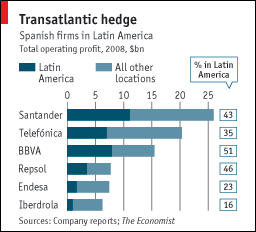A good bet?
Investments in Latin America offer protection against Spain’s slowdown
EUROPE was a grim place during the hard economic and political times of the 17th century. But the mood in Latin America was different, as Ruggiero Romano, a historian, has observed. While Europe's population, consumption and production fell, Spain's colonies thrived.
Spanish companies that have been doing a lot of business in Latin America hope it will buck the trend this time, too. It is so far proving more resilient to the global financial crisis than Spain, where a decade-long boom has come to a halt. Spanish unemployment has just hit 17%, more than twice the European average. The IMF expects Spain's GDP to contract by 3% this year and 0.7% in 2010. Economic output in Latin America, by contrast, is expected to shrink less and recover sooner. The region's institutional strength should shield it from the worst of the crisis, says Alfredo Arahuetes, dean of the Universidad Pontificia Comillas de Madrid.
Telefónica, a Spanish telecoms firm and the biggest investor in the region, says Latin America will be its engine of growth in the next few years. Spanish utilities are also optimistic. “The perception is that Latin American operations are once again becoming a source of strength,” says Sergi Aranda, head of Latin American operations at Gas Natural, a Spanish utility.
This is a turn-up for the books. From Mexico's “tequila crisis” in 1994 to Argentina's collapse in 2001, Spanish companies have been on a roller-coaster ride in the region. After nearly two decades of frenzied activity, Spain is now the biggest foreign investor in the region after America. The first wave of serious interest began in 1993, after the establishment of the single European market. Facing increasing competition and the risk of hostile bids from larger rivals in Europe, Spanish firms went to Latin America in search of profits and greater scale.
This coincided with a wave of liberalisation in the region. Spurred on by cultural affinity and a shared language, Spanish firms collectively spent an average of $9.7 billion a year from 1993 to 2000, mostly in Argentina, Brazil and Chile, says Mr Arahuetes. Subsequent crises and some populist policies dampened enthusiasm. Many Spanish companies made big acquisitions in Europe and America to balance their exposure to Latin America. Even so, they continued to invest in Latin America, albeit at a less frenetic pace.
The numbers are eye-popping. Six firms undertook 95% of the investment by Spanish companies in Latin America: Telefónica, Repsol, Santander, BBVA, Endesa and Iberdrola, according to a study by Enrique Alberola, a senior economist at the Bank of Spain. Gas Natural and Union Fenosa also made big investments. The cumulative gross investment by the top five companies was $170 billion. All this generated $28.9 billion of operating profit in 2008. For the six biggest Spanish investors, Latin America accounted for a good chunk (16-51%) of their profits (see chart).

Telefónica has made the biggest bet, spending a total of $100 billion. Analysts believe Latin American assets account for about a third of its $147 billion enterprise value, including debt. Even taking into account the dividends and management fees repatriated over the years, Telefónica's Latin American investments are worth just 60% of their original cost. But telecoms valuations have come down across the board. And Telefónica's performance in Latin America has markedly improved in the past six quarters, notes Jonathan Dann, an analyst at JPMorgan. It has gained or held market share in all big markets except Colombia. Investors appear to back its strategy: its shares have outperformed those of its rivals in the past ten years, and since the credit crunch hit in August 2007.
Not all investments have the same potential. Repsol learnt this the hard way when it bought YPF, formerly Argentina's state-owned oil firm, doubling the size of the company overnight. It paid $15 billion in 1999, only to see the country's economy go into free fall two years later. YPF missed out on the oil-price boom because price controls forced it to sell at below-market rates. Its reserves are dwindling. Repsol sold 15% of YPF last year to a local businessman, with a loan from Repsol itself. Even so, YPF has supplied an average of over $1.3 billion in annual dividends to Repsol since 1999. And Repsol's Latin American fortunes are turning: three of the world's five largest oil-and-gas discoveries last year were by Repsol in Brazil, Peru and Bolivia.
Latin America is also important for Santander and BBVA, Spain's two biggest banks. The region accounted for 43% of Santander's 2008 operating profit and over half of BBVA's. Although both banks were burnt by Argentina's collapse in 2001, BBVA went on to buy out the other shareholders of its Mexican subsidiary in 2004. That bet paid off: the division created $2.8 billion in net income in 2008, against a total investment of $8.35 billion. But the Mexican economy has contracted sharply. A slowdown in Mexican loans in the first three months of the year has hit BBVA's profits in the region. Even so, Mexico and Brazil still offer greater potential than Spain. Santander has strengthened its presence in Brazil, where it bought Banco Real in the carve-up of ABN AMRO in 2007.
Latin America is not a perfect hedge for Spanish companies. Recent devaluations of some Latin American currencies have dented their profits. But if the region manages to recover quickly from recession, it will provide further vindication of their decision to invest so far from home.
This article appeared in the Business section of the print edition under the headline "A good bet?"
More from Business

America hits Chinese biotech—and its own drugmakers
A sweeping bill in Congress could cost patients at home

Generative AI is a marvel. Is it also built on theft?
The wonder-technology faces accusations of copyright infringement

Who wields the power in the world’s supply chains?
Inventories offer a clue
